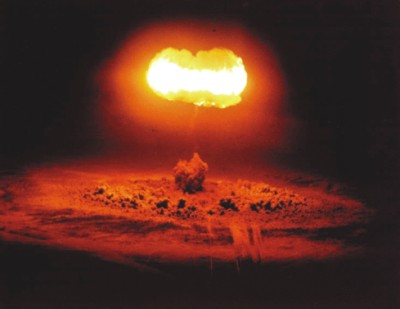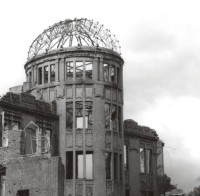In Retrospect
The Bomb at 64 Let's Retire It
William D. Hartung
 It has been over six decades since the first nuclear weapons were used against Hiroshima and Nagasaki, killing and disfiguring hundreds of thousands of human beings in the process. While at the moment it may not be the stuff of dinner table conversation, it's long past time that we had a dialogue about eliminating these weapons of mass terror once and for all. It has been over six decades since the first nuclear weapons were used against Hiroshima and Nagasaki, killing and disfiguring hundreds of thousands of human beings in the process. While at the moment it may not be the stuff of dinner table conversation, it's long past time that we had a dialogue about eliminating these weapons of mass terror once and for all.
Anti-nuclear activism comes in cycles, and each cycle has brought important progress towards reducing the nuclear threat. The ban-the-bomb movement of the 1950s set the stage for the prohibition of above-ground nuclear tests. The nuclear freeze campaign of the 1980s helped turn Ronald Reagan from a reckless, loose-talking cowboy who joked that "the bombing starts in five minutes" into a leader in nuclear arms reductions who almost moved to abolish them in his 1986 summit with Mikhail Gorbachev in Reykjavik.
There have been other signs of progress as well. Global nuclear arsenals have been slashed by two-thirds from their 1960s peak. None of the major nuclear weapons states (Russia, China, the United States, France, and the UK) have tested a bomb since 1992. And since the end of the Cold War, more countries have given up nuclear weapons or nuclear weapons programs than have started them. And since the 1990s, the United States and Russia have worked together to dismantle or destroy thousands of nuclear warheads ("loose nukes"), bombers, and inter-continental ballistic missiles (ICBMs).
Given all of this progress, why don't we feel any safer? There are two reasons. First, there are still 27,000 bombs in the global nuclear arsenal (over 95% possessed by the United States and Russia), enough to destroy life as we know it many times over.
Second, the possession of hundreds of nuclear bombs by Israel, Pakistan and India, along with the bombs and bomb-making programs of Iran and North Korea, make it seem more likely that the 64-year hiatus on the use of nuclear weapons could end, not in a global nuclear conflagration but in a regional nuclear conflict.
 To his credit, President Obama has decided to confront this daunting problem head on by calling for a world free of nuclear weapons. In doing so, the president is building on the calls for eliminating the bomb that have been made by a growing list of former government officials, led by ex-Secretaries of State George Shultz and Henry Kissinger, former Secretary of Defense William Perry, and former Senate Armed Services Committee Chairman Sam Nunn. To his credit, President Obama has decided to confront this daunting problem head on by calling for a world free of nuclear weapons. In doing so, the president is building on the calls for eliminating the bomb that have been made by a growing list of former government officials, led by ex-Secretaries of State George Shultz and Henry Kissinger, former Secretary of Defense William Perry, and former Senate Armed Services Committee Chairman Sam Nunn.
Other presidents, from John F. Kennedy to Jimmy Carter to Ronald Reagan, have called for nuclear disarmament. But no president in the nuclear age has spoken of it as often or worked on it as diligently as has Barack Obama. From recent progress towards a new arms reduction accord with Russia to his proposal for a global anti-nuclear summit in Washington next year, President Obama has put reducing nuclear arsenals high up on his frighteningly crowded agenda.
But to move forward on this issue, the president will need help. Already, the prophets of doom -- from former Bush administration UN Representative John Bolton to the neo-conservative hawk extraordinaire Richard Perle -- have begun to flood the op-ed pages and the cable TV talk show circuit with predictions of dire consequences if the president's modest first steps towards eliminating nuclear weapons take hold. Their arguments may vary slightly, but their underlying message is consistent: nuclear weapons then, nuclear weapons now, and nuclear weapons forever.
That's where the public comes in. When President Dwight D. Eisenhower warned of the dangers of the military-industrial complex, he noted that our only defense against it was "an alert and knowledgeable citizenry." So it is with getting rid of nuclear weapons. The president can lead, but the people need to back him up, not just in opinion polls but in writing to their members of Congress, sending letters to their local papers, holding public forums, and using the diverse communications tools offered by the internet to make the case for "a world free of nuclear weapons." We may not have this good a chance of ridding the world of these instruments of mass annihilation for another generation. We need to join the president and seize the moment.
William D. Hartung is the director of the Arms and Security Initiative at the New America Foundation. This article first appeared in The Huffington Post.
Copyright
(R) thedailystar.net 2009 |
